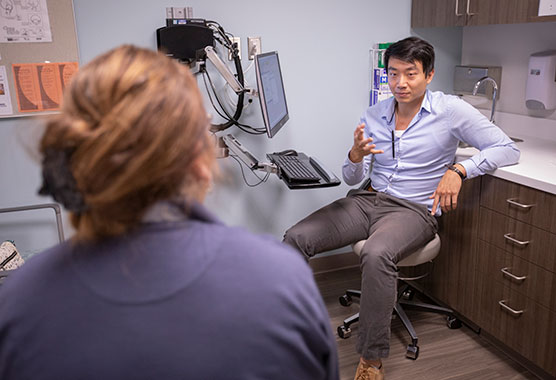Kidney Disease
Our award-winning Division of Nephrology offers evidence-based, patient-centered care for all forms of kidney disease.
Medically reviewed by Hiba Hamdan, M.B.B.S. on Aug. 17, 2023.

Top-Ranked Care for Kidney Disorders
UC Davis Health is home to a renowned team of nephrologists (kidney doctors). Our experts specialize in diagnosing and treating kidney diseases and other conditions that damage your kidneys. Our hospital received U.S. News and World Report’s top “high performing” ranking for kidney failure care.
Our medical practitioners prioritize a patient-centered approach to healthcare. We understand the importance of adopting a healthy lifestyle alongside receiving medical treatment for diseases that affect the kidneys.
Our Difference
Award-Winning Academic Medicine
The Division of Nephrology at UC Davis Health has won multiple awards for teaching and research. We are dedicated to advancing our field of medicine and providing individualized care for all kidney conditions.
Focus on Patient Education
Our specialists recognize the importance of knowledge in empowering people to take better care of themselves. We educate you about kidney health and offer strategies for preventing and treating kidney disease.
Coordinated Care
Our nephrologists adopt a life course approach to kidney care. They work with other experts to establish a comprehensive and seamless treatment strategy. This encompasses dialysis care as well as the planning and coordination of transplant needs.
What Is Kidney Disease?
Your kidneys are amazing organs that filter waste and extra water out of your body. Loss of kidney function results in kidney disease.
Kidney disease occurs when your kidneys lose their ability to filter waste, causing it to build up in your blood. This can make you feel sick. Untreated kidney disease can progress to kidney failure.
Kidney failure means you have less than 15% of your normal kidney function. When this happens, you may need dialysis (a treatment to remove waste from your blood) or a kidney transplant.
Early detection of kidney damage can slow or stop the disease.
Complications of Kidney Disease:
Anemia
Your kidneys produce a hormone called erythropoietin (EPO). EPO stimulates your bone marrow to make red blood cells. Loss of kidney function can result in low levels of EPO, which can cause anemia (low red blood cells). Anemia can lead to fatigue and shortness of breath. Over time it can strain your heart.
Bone Disease and Muscle Weakness
Chronic kidney disease can result in weakened bones and loss of muscle mass. This can cause fatigue and frailty, as well as increase your risk for falls and fractures.
Coronary Artery Disease (CAD)
Damaged kidneys cause waste and toxins to build up in your blood vessels. This buildup puts stress on your heart and makes it work harder to pump blood to the rest of your body. The strain can cause you to develop CAD. CAD is a leading cause of mortality in people with kidney disease.
High Blood Pressure
Blood pressure measures the force of blood pressing on your arteries as it flows through your body. Kidney disease causes a buildup of fluid in your blood vessels, raising your blood pressure.
Causes of Kidney Disease
Kidney disease can arise from various factors. A congenital anomaly, genetic predisposition, or underlying medical condition can all contribute to impaired kidney function. However, two specific medical conditions, namely diabetes and high blood pressure, are responsible for over half of all instances of kidney disease.
Top causes:
Diabetes
Diabetes causes high blood sugar levels. High blood sugar can damage the blood vessels in your kidneys. This damage makes it difficult for your kidneys to filter waste and fluid.
High Blood Pressure
High blood pressure damages and weakens your blood vessels, causing them to constrict. Narrowed blood vessels slow blood flow to your body, including your kidneys. This leads to kidney disease.
Why Kidney Function Matters
Your kidneys are very important to your health. They filter out waste and toxins from your blood. They help balance your body’s levels of numerous chemicals.
Your kidneys also produce hormones that control red blood cell production and blood pressure levels. Healthy kidney function supports many other systems in your body and helps maintain a healthy and balanced internal environment.

Request an Appointment
As Sacramento's No. 1 hospital, you'll benefit from unique advantages in primary care and specialty care. This includes prevention, diagnosis and treatment options from experts in 150 specialties.
Referring Physicians
To refer a patient, submit an electronic referral form or call.
800-4-UCDAVIS
Patients
Call to make an appointment.
Consumer Resource Center
800-2-UCDAVIS

Ranked among the nation’s best hospitals
A U.S. News & World Report best hospital in cardiology, heart & vascular surgery, diabetes & endocrinology, ENT, geriatrics, neurology & neurosurgery, and pulmonology & lung surgery.

Ranked among the nation’s best children’s hospitals
U.S. News & World Report ranked UC Davis Children’s Hospital among the best in pediatric nephrology, orthopedics*, and pulmonology & lung surgery. (*Together with Shriners Children’s Northern California)

Ranked Sacramento’s #1 hospital
Ranked Sacramento’s #1 hospital by U.S. News, and high-performing in aortic valve surgery, back surgery (spinal fusion), COPD, colon cancer surgery, diabetes, gynecological cancer surgery, heart arrhythmia, heart failure, kidney failure, leukemia, lymphoma & myeloma, lung cancer surgery, pacemaker implantation, pneumonia, prostate cancer surgery, stroke, TAVR, cancer, orthopedics, gastroenterology & GI surgery, and urology.

The nation’s highest nursing honor
UC Davis Medical Center has received Magnet® recognition, the nation’s highest honor for nursing excellence.

World-class cancer care
One of ~59 U.S. cancer centers designated “comprehensive” by the National Cancer Institute.

A leader in health care equality
For the 13th consecutive year, UC Davis Medical Center has been recognized as an LGBTQ+ Healthcare Equality Leader by the educational arm of America’s largest civil rights organization.

